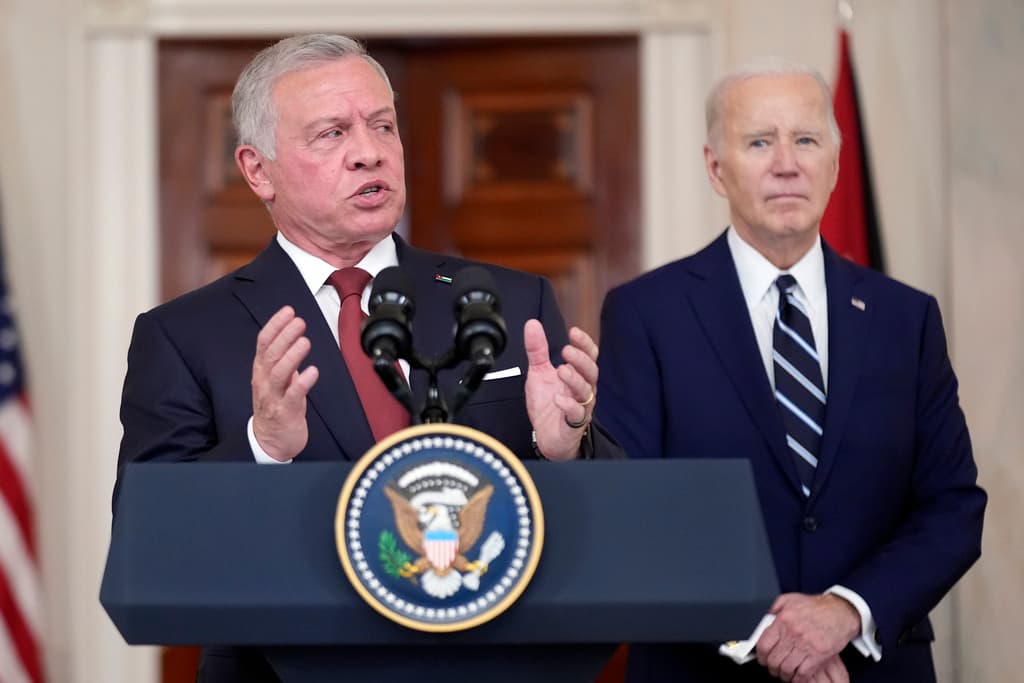Is Iran Poised To Add Jordan to Its Anti-Israel ‘Ring of Fire’ Strategy?
Tehran has taken note as King Abdullah II since October 7 has been under tremendous pressure from the Jordanian streets. In a country where the majority of the population claims Palestinian heritage, anger over the Gaza war is growing.

Will the Kingdom of Jordan, a longstanding American ally, fall prey to the Islamic Republic of Iran’s strategy of surrounding Israel with enemies intent on erasing the Jewish state off the map?
Since October 7, King Abdullah II has been under tremendous pressure from the Jordanian streets. In a country where the majority of the population claims Palestinian heritage, anger over the Gaza war is growing. After years in which the influence of militant Islam declined in the kingdom, pro-Hamas sentiments are now rising.
In the last 10 days, the Israeli embassy at Amman has been under siege by thousands of angry protesters. Israeli officials fear that this Friday, on the Iranian-inspired “Jerusalem day,” the anger could overwhelm local security forces that so far have managed to defend the embassy.
The angry crowds are demanding that Jordan sever all diplomatic, military, and intelligence ties with Israel, and end the 29-year-old peace treaty between the Hashemite Kingdom and the Jewish state.
Iranian proxies, including Shiite militias from Iraq and Afghanistan, are using the Jordanian anger to recruit and arm local militants. Amman officials were startled in January, when an Iranian-backed Iraqi militia attacked an American base in northern Jordan, killing three American soldiers.
Even as increasingly active Iranian proxies infiltrate Jordan, angering the palace, Tehran is making diplomatic overtures to King Abdullah. “Tehran’s diplomacy complements its military pressure on Jordan,” an Iran and Shiite militias watcher at Israel’s Misgav Institute, Yossi Mansharof, tells the Sun.
Ten years ago Jordan rejected an Iranian offer to supply free oil to the kingdom. Now Tehran is trying again to tighten relations, Mr. Mansharof says, The Iranian foreign minister, Hossein Amir-Abdollahian, is urging his Jordanian counterpart, Ayman Safadi, to join Saudi Arabia in a regional rapprochement between Sunni and Shiite Mideast countries.
The Islamic Republic is using the Jordanian public’s anger at the Gaza war to get close to Amman in order to open a new front against Israel. Its “ring of fire” strategy includes Lebanon’s Hezbollah and allied Syrian militias threatening northern Israel, the Yemeni Houthis in the south, and Iraqi militias farther to the east.
Hamas’s October 7 war is raising passions across the Arab world, and the Iranians believe Jordan may be ripe for the picking. Turning the Hashemite Kingdom into an Islamic Republic ally could help its efforts to arm proxy West Bankers, leading to a full-fledged terrorist war on the heart of Israel, its most populated area around Tel Aviv.
“If Iran can establish a land bridge through Jordan into the West Bank, the operational environment in Israel changes significantly,” a senior fellow at the American Enterprise Institute, Michael Rubin, wrote recently.
To appease the Jordanian crowds, the Amman palace is increasingly sharpening anti-Israel rhetoric. Queen Rania, whose Palestinian parents hail from the West Bank, has been a frequent guest on CNN and other Western media outlets, where she has condemned Israel in harsh tones.
In a recent interview, the Jordanian queen said there was no proof that Hamas beheaded babies on October 7, said Israel is guilty of a “slow motion mass murder of children” in Gaza, and accused America and others of “double standard” in favor of israel.
In January the Jordanian foreign minister, Mr. Safadi, associated Jordan with South Africa’s allegation of Israeli “genocide” in the International Court of Justice. The “starvation policy that Israel is using against the Palestinians in clear violation of international law, which represents another war crime that Jordan has confronted with all its capabilities,” he said.
At the start of Ramadan Mr. Safadi warned Israel that “desecrating the sanctity of Al-Aqsa Mosque is playing with fire.” Hamas called its October 7 attack “al Aqsa flood,” and now Tehran officials similarly use the word “flood” in their rhetoric as they evoke passions over Islam’s holy mosques.
“I don’t understand why King Abdullah doesn’t rein his foreign minister in,” the Foundation for Defense of Democracies’ CEO, Mark Dubowitz, tells the Sun, adding that Amman’s statements go “beyond hard criticism of Israel.” For decades, he notes, there has been a “very strong security coordination between the Jordanian security, the CIA, and Israel” to maintain the Hashemite hold on power. Israel supplies most of Jordan’s water needs.
The current monarch’s father, King Hussein, verged on losing power to Palestinian terrorists and other extremists several times during his reign, and each time the Israelis and Americans have saved his kingdom. While quiet security cooperation remains tight, Amman’s diplomatic assault on Israel now endangers relations.
Both Jordan and Israel would suffer, as would America. “A collapse of the Hashemite Kingdom will be devastating for Israel’s security and American influence in the region,” Mr. Dubowitz says.
For the Islamic Republic, conversely, the fall of one of America’s closest allies in the Arab world could complete a strategy it has long cultivated. Is Washington paying attention as Jordan is under threat to become an Iranian ally and a Hamas-like entity dedicated to eradicating Israel? American interests could depend on it.

